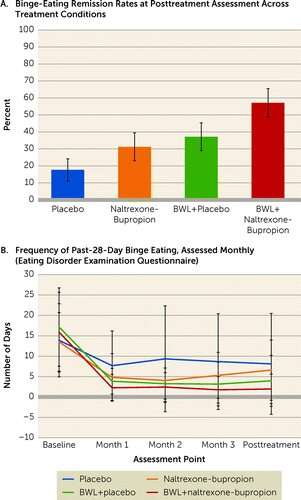People with binge-eating disorder benefit from specific behavioral therapy and medication

A new Yale study found that patients with binge-eating disorder (BED) and obesity can be helped quickly and benefit significantly from a specific behavioral therapy and a specific medication.
The study, published in the American Journal of Psychiatry, tested behavioral weight loss treatment (a behavioral therapy focused on gradual behavioral lifestyle changes, including moderate reductions in caloric intake and increases in physical activity, and learning behavioral techniques, self-monitoring, and problem-solving skills to address challenges).
It also tested a specific pharmacological treatment (naltrexone-bupropion combination medication which is FDA-approved for weight-loss in persons with obesity). These treatments were tested alone and combined in 136 patients with BED and coexisting obesity.
Researchers found that behavioral weight loss therapy and naltrexone-bupropion were associated with significant improvements in BED. The results showed a consistent pattern of behavioral therapy being superior to no therapy for the primary outcomes of reducing binge eating and weight loss, and for secondary measures of reducing eating-disorder psychopathology, depression, and improvement of cardiometabolic variables.
The study did not find a significant interaction for the behavioral and pharmacological therapies, suggesting little advantage to combining the treatments for persons with BED.

BED is the most prevalent eating disorder in adults in the United States. People with BED eat unusually large quantities of food in short periods of time while experiencing a subjective sense of loss of control over the eating. The binge eating frequently occurs when they are alone, despite not being hungry, often leads to physical and emotional discomfort, and is typically accompanied by strong feelings of distress, shame, and disgust.
BED is a major public health problem. It is strongly associated with obesity, with significantly heightened risk for associated psychiatric and medical comorbidities, and with a range of functional impairments and psychosocial problems, including suicidality. It remains under-recognized or diagnosed and infrequently treated although it is associated with high healthcare utilization for other or associated health concerns.
The study was led by first author Carlos Grilo, Ph.D., professor of psychiatry and of psychology at Yale School of Medicine, and colleagues at Yale POWER, which aims to develop and improve treatments for eating disorders and obesity.
"Many people with BED suffer in silence for many years because of shame and stigma, and because healthcare providers often fail to recognize the problem," Grilo said. "It is important for practitioners and the public know that effective treatments are available and some of these can help people rather quickly.
"The present study provides further evidence for the effectiveness of behavioral weight loss therapy for BED," he said.
"This treatment is more widely available than effective specialist treatments, such as cognitive-behavioral therapy and interpersonal psychotherapy, and has the added benefit of producing some weight loss and associated health benefits. This study also provides support for the potential effectiveness of naltrexone-bupropion for BED, although further research is needed. This line of research is important as there currently exists only one FDA-approved medication for treating BED i.e., lisdexamfetamine. Lisdexamfetamine, however, is not indicated for persons with histories of substance misuse and its safety and effectiveness for obesity are yet to be established."
More information: Carlos M. Grilo et al, Naltrexone-Bupropion and Behavior Therapy, Alone and Combined, for Binge-Eating Disorder: Randomized Double-Blind Placebo-Controlled Trial, American Journal of Psychiatry (2022). DOI: 10.1176/appi.ajp.20220267





















